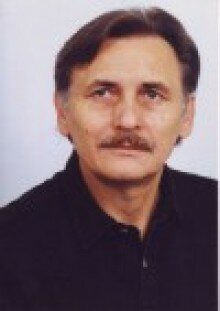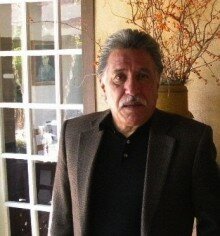
Slavko Jendričko was born in 1947 in Komarevo, a village in central Croatia near Sisak. He studied at the School of Economics in Zagreb and graduated from the School of Business Administration and Information Sciences in Varaždin. Jendričko worked in Sisak as an economist and bank clerk, and is now editor of a distinguished literary magazine there, Riječi. His first poems were published in the mid-1960s, and his first book of poetry, Nepotpune dimenzije, was published in 1969 by Matica hrvatska Sisak. Thus far he’s published sixteen books of poetry and a book of essays and prose vignettes, Novčić za Harona (1995). His work has been included in all important reviews and anthologies of contemporary Croatian poetry. Anthologies of his poetry have been published in Italian and Slovenian. Jendričko was awarded the Grad Sisak Award for contribution to the city’s cultural development (2000) and the St. Quirinus Plaque for his poetic oeuvre (2006).
An important part of Slavko Jendričko’s poetry published up to the mid-1990s used neo-avant-garde linguistic devices. Structuralist and post-structuralist movements understood language as a system of signs which gain arbitrary meaning through conventional usage. The sound images of words, the way they are pronounced, run parallel to the images that indicate their semantic meaning. The relationship between the word and the mental image, where the later gives a certain meaning to the former, cannot be changed. Still, the view that the system functions in two parallel streams led to completely new possibilities of expression.
In Croatian poetry of the 1970s and 1980s these new theories undoubtedly had an emancipating role: by shifting the focus to the way language operates, the language practice itself, the poetry was freed from the pressures of tradition and could take on new dimensions. Jendričko’s early books, most particularly Tatari / kopita (1980) and Proroci, novci, bombe (1986), are the best examples of the new poetic expression inspired by neo-avant-garde thought.
His interest in this form culminated in a book of his selected poems, Orguljaš na kompjutoru (1999), after which Jendričko developed a poetry which, according to its basic intonation and subject matter, could be labelled “intimate and confessional”. In his later poetry, linguistic concepts are overshadowed by his lyrical style. A prominent feature of that style lies in his use of figures of speech, such as metaphor and metonymy. From one poem to another, Jendričko employs them in almost the same way to reconstruct particular events taken from different areas of his closed, personal world. Defamiliarization is naturally one of the most important concepts in this process of building a poem.
In the books of poetry published in the past few years, Podzemni Orfej (2001), Kada prah ustaje (2005) and in his latest book, U kući malih pustinja (2007), specific, very complex emotional states and deeply personal images have come to the foreground. When a certain public event is described, the poetry is marked with irony and even cynicism. On the other hand, while drawing a basic emotion such as love, the poet’s reflections on passion, lust, greed, loss are combined with sketches of ordinary moments of peace as found within one’s home or family. Even if we witness a certain detachment (for example, indicating one of the many possible exits from these dense emotional states and external situations the lyrical voice describes), these are at the same time markers of the final stage in a great poetic opus, which occupies a very prominent position in post-war Croatian poetry.
Bibliography
Poetry
Nepotpune dimenzije, MH Sisak, Sisak 1969
Ponoćna kneževina, Duhovni poligon, Sisak 1974
Tatari / kopita, author’s edition, Sisak 1980
Naslov, ICR, Rijeka 1983
Autoritratto con melo – selected poems in Italian, translated by Giacomo Scotti, Coop-Ed, Le Sfinge, Naples 1983
Crvena planeta, Centar za kulturu Sisak, Sisak 1985
Proroci, novci, bombe, author’s edition, Zagreb 1986
Svečanost glagoljice - co-author, Centar za kulturu Sisak, Sisak 1989; 1990
Hrvatska sfinga, MH Sisak, Sisak 1992
To si ti, Meandar, Zagreb 1995
Hrvaška sfinga – selected poems in Slovene, selected and translated by Franci Zagoričnik, Zbirka Ap-art, tamizdat, Kranj-Sisak, 1995
Zimska katedrala, Meandar, Zagreb 1999
Orguljaš na kompjutoru – Selected Poems 1969-1999, MH Sisak, Sisak 1999
Podzemni Orfej, Meandar, Zagreb 2001
Kada prah ustaje, MH Sisak, Sisak 2005
U kući malih pustinja, HDP-Durieux, Zagreb 2007
Fiction
Novčić za Harona, Centar za kulturu "Vladimir Nazor", Sisak 1995
Awards
City of Sisak Cultural Award, 2000
St. Quirinus Plaque for Poetry Oeuvre, 2006








